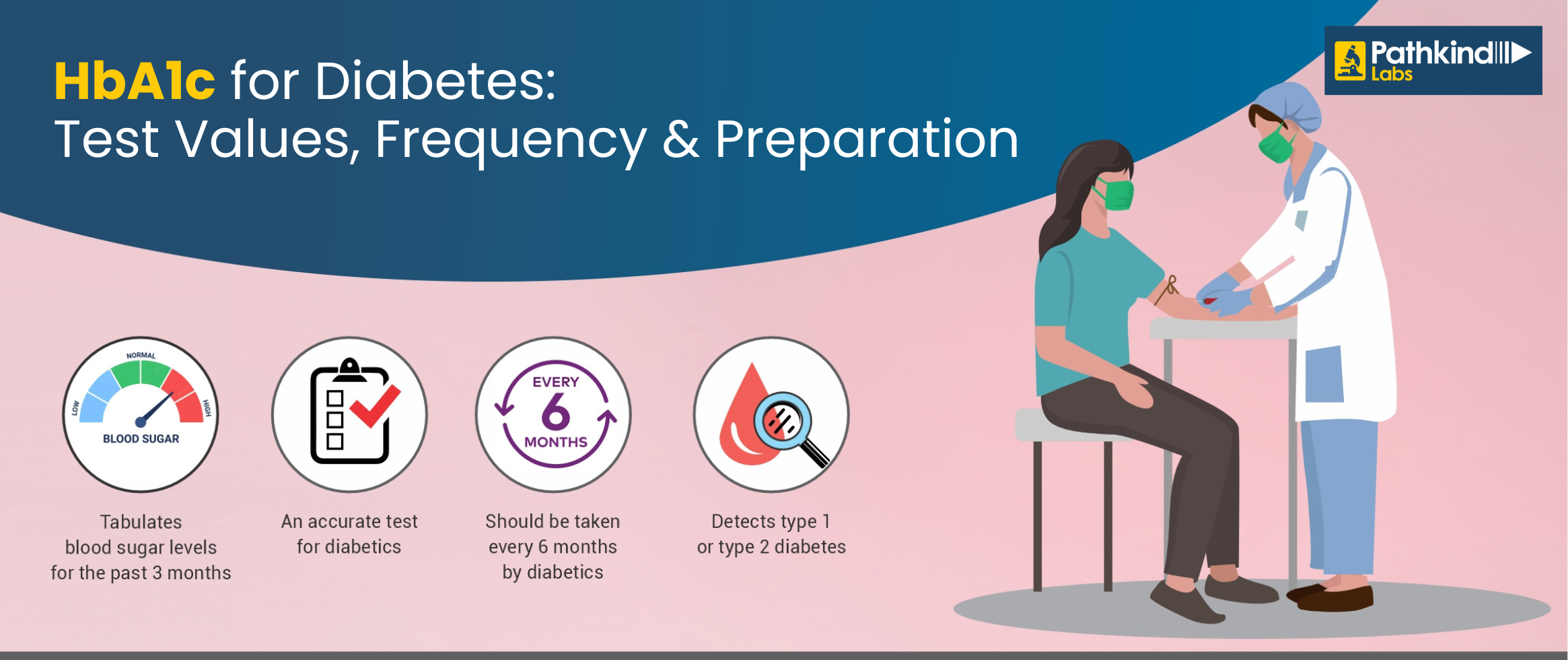
We’ll confirm your booking shortly!
Please provide your number to receive updates.
Enter the 6-digit verification code we just sent you to through SMS. Change Mobile

Are you conscious about your blood sugar levels and take post-meal and fasting blood sugar tests on a regular basis? Do you think these tests are enough to keep track of your blood sugar level? Well, these tests are essential to supervise your blood sugar level; but the validity of the sugar level check is based on the point of time when you get your sugar test done. The results may also vary based on what you ate last night or the meal that you consumed before taking the test.
But, to gain detailed information, these tests are not enough. To get a more detailed and accurate report, one should consider going in for an HbA1c test which tabulates the blood sugar level based on three months’ data and does not produce biased results. Read on to find out more about what is HbA1c test and its associated details:
HbA1c is the glycated haemoglobin that develops when the glucose or sugar in your body bonds with the red blood cells. When your body fails to adequately use the sugar in your body, it sticks to the red blood cells and causes a build-up of glycated haemoglobin, which causes a spike in the blood sugar level. To diagnose the sugar level, an HbA1c test is conducted, which is different from the regular finger prick sugar test.
The HbA1c test is basically conducted to detect type 1 and type 2 diabetes or prediabetes conditions in adults. Red blood cells stay active for a period of two to three months; hence the HbA1c test reading is taken on a quarterly basis.
A higher percentage of HbA1c indicates that the sugar level in your blood is high and can result in diabetic complications and serious health issues. Getting an HbA1c test done and consulting a doctor to know about the things that you can do to lower your blood sugar level can help you gain control over the complications that come along with blood sugar. Thus, it is imperative to get an HbA1c test done on a regular basis as prescribed by the doctor.
A person who is healthy can go for an annual HbA1c test, but if you have a diabetic family history or have no control over your sugar-eating habits, this test should be taken every three or six months. It will help you to monitor your sugar level and accordingly take precautions that can prevent the sugar level from hiking up.

The HbA1c test is conducted for diagnosis and monitoring purposes of your blood sugar level. Doctors usually prescribe this test to find out if their diabetes is under control or not. People with borderline diabetes and pre-diabetic conditions have also been prescribed this test to check the stability of their blood sugar levels.
The result of the HbA1c test is presented in percentage format and shows the haemoglobin count that has been bound with the glucose in your blood. If you have not had diabetes before, then an HbA1c result that comes out to be more than 6.5% is an indicator that you have diabetes. If the percentage count comes to be less than 6.5%, then you might have to undertake other tests as well to ensure if you have diabetes or not.
This is a generalized test result for diagnostic purposes. But in some cases, the HbA1c test results stay affected due to other medical conditions which can give higher readings. Here are a few conditions that can cause alterations in the HbA1c results:
Thus, it is always best to consult a doctor for the analysis of results.
People who have diabetes should consider getting themselves tested in a gap of every three months. On the contrary, if you do not have diabetes but have a diabetic family history or follow a lifestyle that makes you prone to fall prey to diabetes, you should get the HbA1c test done twice a year in a gap of six months. Moreover, you should consult your doctor on how frequently you should take the test according to your health condition.
As such, no special preparation is required for undergoing an HbA1c test, but you should let your doctor know about any medications you are taking. Also, you are not required to fast before taking the HbA1c test, and you can give the sample for the test at any point in time.
To book a Diabetes Test Package, visit our website or you can even visit our nearest Pathology laboratory for more information.
Discover precision diagnostics with Pathkind Labs, a trusted name in diagnostic services in India. Our NABL accredited labs, equipped with advanced technology, are staffed by a certified team of over 200+ senior pathologists and 2000+ technicians. From tailored health check-ups to specialized tests in Oncology, Neurology, Gynaecology, Nephrology, and more, we've got your health covered. Skip the hassle with online booking for tests or check-ups, available for both lab visits and at-home blood collection. For a seamless experience and early detection, choose Pathkind Labs in Gurugram. Book your appointment today and experience diagnostics made easy.
© 2025 Pathkind Diagnostics Pvt. Ltd. All Rights Reserved | Unsubscribe
